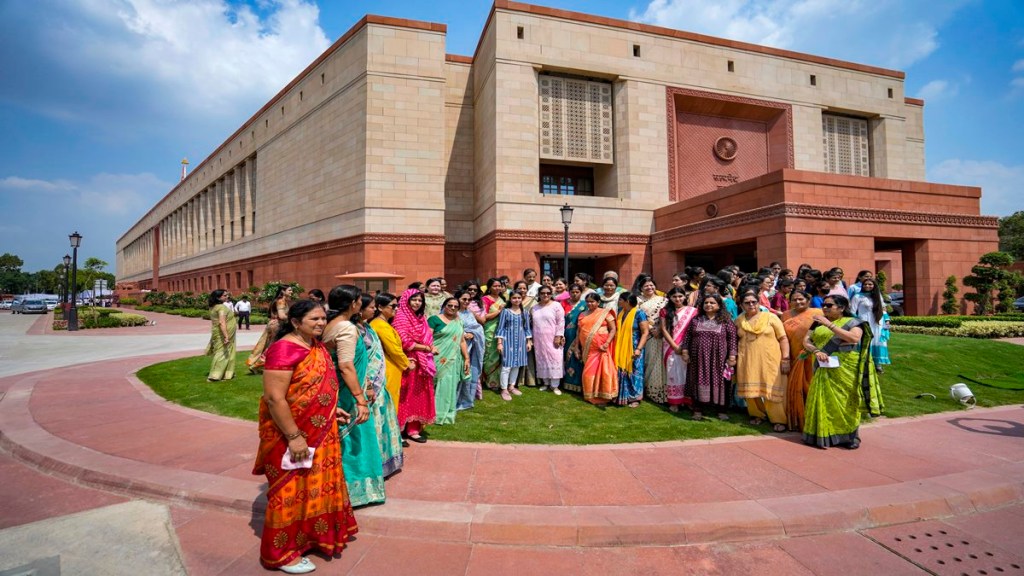By Sandeep Chachra
In a historic turn of events, the passage of the Women’s Reservation Bill at the special session of the Indian Parliament, held in its new building, marks a momentous milestone for gender equality in India. The bill will reserve 33% of seats in the Lok Sabha and State Legislative Assemblies for women, ensuring their voices are heard and significant in the decision-making process.
This monumental step towards empowering women in politics is a realization of the vision set forth by Dr. B. R. Ambedkar 75 years ago. Dr. Ambedkar, a staunch advocate for social justice and equality and a key architect of the Indian Constitution, recognized the critical importance of women’s participation in the political sphere.
His foresight laid the foundation for a more inclusive and equitable India where women would stand shoulder-to-shoulder with their male counterparts in the corridors of power.
The first significant shift for the passage of the Women’s Reservation Bill in local bodies and Panchayats occurred with the 73rd and 74th Constitution Amendments Acts of 1992-93. These Acts mandated all State Governments to reserve one-third of all seats for women in Panchayat Raj Institutions and urban local bodies and one-third of the offices of chairpersons at all levels. Within these seats, one-third are reserved for women from Scheduled Castes/Scheduled Tribes.
As a result of this decision, today, nearly 15 lakh elected women in Panchayats and Nagar Palikas across the country are making grass roots democratization real in the lives of our women and men.
Throughout history, entrenched patriarchal power structures and institutional barriers have perpetuated the marginalisation of women in governance. This pattern of women’s exclusion from political decision-making is not unique to India; it is a global phenomenon.
Only 24.3% of elected representatives worldwide are women (UN Women, 2019). Despite some countries making notable strides in gender equality, the pace of change remains slow. According to estimates by UN bodies, it may take until 2066 to achieve gender equality in governance at the current rate of progress.
The Women’s Reservation Bill represents a break from this historical pattern of exclusion of women. It is a crucial step towards addressing the deeply ingrained gender imbalances in Indian politics. The marginalisation of women from governance structures reflects a broader societal imbalance between men and women. Conservative and patriarchal mindsets among elected representatives and the wider community have resisted women’s political empowerment.
Mere presence of women in political leadership threatens the societal status quo. It amplifies the much needed women’s voices within governance processes, leading to a more responsive governance. Numerous researches around the globe will tell us that presence of women in politics has positive outcomes for gender-sensitive policies and public services (including better health and education for both women and men) and ultimately a more equitable society (World Economic Forum, 2017; United Nations; Observer Research Foundation).
Furthermore, reporting on crimes against women increases, as does gender-responsive action addressing violence against women.
In the recent decision, there is a specific allocation for women from Scheduled Castes and Scheduled Tribes and the Anglo-Indian community. This is an important intersectional step towards addressing not only gender disparities but also addressing historical injustices faced by marginalised women on account of caste and ethnicity.
However, it also raises pertinent questions about extending reservations to other vulnerable groups. One of the pressing issues is the absence of reservations for Other Backward Classes (OBCs), religious minorities, and the LGBTQIA+ community. Moreover, the question of why there should not be more than 33% reservation for women is a valid one. Why not aim for 50% reservation for women as it happened in the case of urban and rural local bodies in several states, which would mirror their share in the population? Such a move would be a powerful statement reinforcing the commitment to gender equality.
As we look forward to the future, it is crucial to recognise that the passage of the Women’s Reservation Bill is not the endpoint but a significant step forward, opening doors to address several critical unfinished agendas integral to achieving a just and equal India for all women of our land. These include recognising unpaid care work of women and ensuring its redistribution, eradicating the barriers to women’s property ownership, making sure that gender pay gaps are closed, and gender inequalities in our country’s earnings are put to an end.
The passage of the Women’s Reservation Bill in the Indian Parliament is a welcome and historic moment that acknowledges the persistent struggle to overcome patriarchal norms and resistance to women’s political empowerment. It marks a significant shift in social progress.
At the same time, women’s representation and genuine gender equality is an unfinished agenda. As this legislation paves the way for a more inclusive and equitable political landscape, where women’s voices and perspectives can shape the nation’s future, let’s not forget the path ahead as the journey is far from over.
The author is executive director of ActionAid Association, a global agency, which supports social and ecological justice in 40 countries, and has been actively engaging with India’s most marginalised communities since 1972.
Disclaimer: Views expressed are personal and do not reflect the official position or policy of Financial Express Online. Reproducing this content without permission is prohibited.

